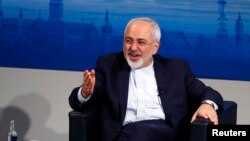Envoys from Iran and Saudi Arabia took part in peace talks in Germany this week to try to resolve the Syrian conflict, which produced a rare public attempt to bridge the two rivals' deep differences.
Iranian Foreign Minister Mohammad Javad Zarif appeared to extend an olive branch, saying, “Iran and Saudi Arabia must overcome years of strained relations and work for stability in Syria and the Middle East.”
Tensions between Iran and Saudi Arabia have soared in the past year over the wars in Syria and Yemen, as well as accusations on both sides that they are fanning Sunni-Shi'ite sectarian tensions across the Middle East.
Relations worsened in January following the Saudi execution of a prominent Shi’ite cleric. That led to attacks on Saudi missions in Iran, a move that prompted the kingdom to sever ties with Tehran.
But during the Munich Security Conference, Zarif expressed hope for collaboration.
“We believe there is nothing in our region that would exclude Iran and Saudi Arabia working together for a better future for all of us," he said.
He said the two countries faced “common threats,” including the Islamic State and al-Nusra Front terrorist groups.
The Islamic State and terrorism as a whole were underlying themes for the high-ranking government officials who spoke at the conference. Many called for broader international efforts to combat terrorist groups.
More than military response
The global threat posed by the Islamic State requires not only a military response but also efforts to hamper the group’s infrastructure and logistics, said French Defense Minister Jean-Yves Drian. He said world powers needed to cooperate more in efforts to disrupt the terror group’s communications in order to stop its ability to “spread propaganda.”
Iraqi Prime Minister Haider al-Abadi said external factors had contributed to the presence of militants in his country.
“Unfortunately, not enough work has been done to combat the flow of terrorists, foreign terrorists, from Turkey to Syria to Iraq,” he said.
Jordan’s King Abdullah said combating terrorism required a “holistic approach” with a “global perspective.”
World powers will not succeed by focusing on Islamic State in Iraq and Syria while “other terrorist groups and affiliates strengthen in Africa and Asia,” he said.
The Munich Security Conference is an annual global forum for discussions on security policy. U.S. Secretary of State John Kerry is among speakers who will address the group Saturday.




